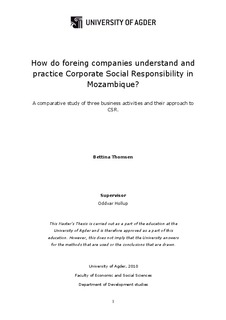| dc.description.abstract | Corporate Social Responsibility (CSR) which is a set of standards to which a company
subscribes in order to make its impact on society is believed to have potential to contribute to
sustainable development and poverty reduction in the world by addressing one or more of the
four responsibilities described by Carroll in his CSR Pyramid, and later revisited by Visser.
The impacts however will depend on which approach a business chooses.
Therefore, this study takes the stand that it no longer is a discussion about whether or not a
company has a role to play in development and reducing poverty in developing countries, but
rather a discussion about how they can contribute. Three different approaches used by foreign
companies with operations in Mozambique acting social responsible have been compared.
The approaches are; an integrated approach, a business-to-business partnership approach and
last, a social community investment approach.
There is not enough evidence to find a common definition and understanding of CSR in the
three cases. The Danish approach is much wider compared to the Mozambican approach that
has a tendency to focus mainly on philanthropy.
Visser is addressing some of the challenges for CSR in Africa due to the social needs - despite
decades of aid and development effort (Visser, 2006:31). The study reveals that philanthropic
responsibilities supporting employees with e.g. transport, health assistance or access to microfinance
can have a positive impact for the employee and their families. Furthermore, legal and
ethical responsibilities taking into consideration elements such as workforce and environment
can support a company moving towards integrating CSR as part of a company’s business
strategy, and hereby move CSR beyond philanthropy.
It is not possible to say that one of the approaches is more suitable than the other. On the other
hand the study indicates that there is a call for bringing CSR to a level where everyone can
participate whether it is an MNE or an SME. It will implicate that each company takes into
consideration available resources, being it financial, competences or time before choosing the
approach that best suits their business.
Key words: CSR in global context, developing countries, Mozambique, businesses activities,
applying CSR, philanthropy, social community investment, inclusive business. | en_US |
